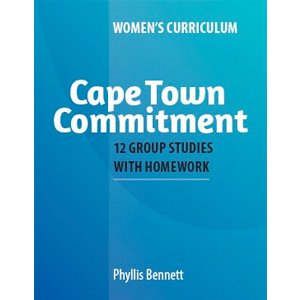Male and Female as Full Gospel Partners
Imagine a sports team fighting for the championship. Would the coaches choose to send to the field only half their team? Who would bench trained and needed players in the face of its greatest challenge? Yet often, some Christians do just that. Many underutilize godly and gifted players, even though we are engaged in a battle infinitely larger and more consequential than a sports contest. What if completing the Great Commission needed the full partnership of God’s godly daughters laboring alongside God’s godly sons?
As is articulated in The Manila Manifesto, the Lausanne Movement affirms ‘that the gifts of the Spirit are distributed to all God’s people, women and men, and that their partnership in evangelization must be welcomed for the common good.’ 1
What if completing the Great Commission needed the full partnership of God’s godly daughters laboring alongside God’s godly sons?
The Cape Town Commitment further affirms women and men in partnership: ‘Women and men are thus equal in creation, in sin, in salvation, and in the Spirit.’ Lausanne recognizes ‘the enormous and sacrificial contribution that women have made to world mission, ministering to both men and women, from biblical times to present.’2 These statements are intended to encourage men and women to partner together in mission. Despite the breadth of global Christianity that these affirmations represent, many men and women do not enjoy the blessings intended for participation in global mission today when this partnership is broken or neglected.
While the shared leadership of men and women has sadly sparked division in the church, there is no dispute in affirming that both men and women have a:
- Shared origin as God’s image-bearers.
- Shared mandate to govern creation.
- Shared enemy (Satan).
- Shared Fall.
- Shared redemption.
- Shared Holy Spirit who calls and gifts.
- Shared legacy in shaping the early Christians.
- Shared Commission to go, make disciples, baptize, and teach in Christ’s authority.
- Shared eternal destiny.
From our image-bearing origin to our global commission and beyond, men and women form God’s whole ‘dream team’!

Current Global Reality: Men and women are reaping the harvest
Three billion people have yet to hear the name of Jesus Christ. When both men and women share the gospel, God moves! The Spirit of God is using women to serve in fruitful Great Commission ministries alongside their co-laboring brothers despite some limitations that Christian women encounter3:
The Middle East: Reports suggest that one of the fastest growing churches in the world is the Iranian church. Local leaders attribute growth in this persecuted context to the substantial number of brave women evangelizing and co-leading within a house church model.4 One ministry reports that about half of all the church and ministry leaders are women.5
China: In previous decades, the unofficial church exploded in numbers as Spirit-gifted men and women preached and oversaw house churches. For many years, more than half the church leaders (‘co-workers’) were women. But recent testimonies from Chinese Christian women report that the growing influence of teachings about church policy and structure from outside of China has in some cases restricted women from joining their brothers in leadership.6
Southern Africa: One local Zambian church had a vision to plant churches across their nation. When they prayed for workers, they did not expect God to send . . . men and women. Many women, some disabled, walked or hobbled long distances telling of their call from God to plant networks of churches. The countercultural obedience of these sisters moved the gospel to unchurched areas in Zambia.7
South Asia: Local believers sent out both men and women into a dangerous, remote area. Now a previously unengaged, unreached people group has gospel access, and the first group of baptized believers is gathering.8 Some report a movement of over 4,000 women equipped as disciple-makers who have planted churches in 20,000 villages. With strong DNA of multiplication, many house church streams have reached fifth, eighth, or even twelfth generations of daughter churches.9
Southeast Asia: Begun during the COVID-19 lockdowns of 2020-2021, a movement of over 2,000 women equipped as disciple-making Movement leaders have led thousands to Christ.10
These pioneering women join their brothers to reflect a deep biblical tradition.
- Like Miriam, many serve in leadership teams alongside men.11
- Like Deborah, many guide God’s people with gifts of wise conflict resolution, prophetic discernment, and strategic delegation. 12
- Like Huldah, many are chosen by God to discern the present priorities for God’s people.13
- Like the Samaritan woman, many are instrumental in bringing the gospel to their villages.14
- Like Mary Magdalene, many have received Christ and go out to witness.15
- Like Lydia, many are chosen by God, and they open new areas and their homes to gospel messengers.16
- Like Priscilla, many care for churches, disciple believers, and raise up more teachers.17
- Like Junia, many ‘are outstanding among the apostles’.18
Thousands of women and men come to faith every day around the world. Many echo the callings and giftings of their biblical sisters. These biblical and current examples reveal God’s intent for female and male image-bearers to serve as his dream team.

Challenges from Today to 2050
Despite many exciting advances in global evangelism, we recognize that church growth is not keeping up with population growth.19 At the time of this writing, 86 percent of Muslims, Buddhists, and Hindus have never met a Christian.20
Men and women should be encouraged to partner together, whether informally or formally to take the gospel to the unreached and lost. Both male and female disciples need to be equipped and empowered to share, to demonstrate, and to proclaim the gospel because there are places where men cannot reach women, and places where women cannot reach men.21
Issues related to men, women, and the family pose significant challenges to Great Commission efforts, but in Christ, each of these challenges offers incredible opportunities for gospel advancement.
Both male and female disciples need to be equipped and empowered to share, to demonstrate, and to proclaim the gospel because there are places where men cannot reach women, and places where women cannot reach men.
Critical Theory and Secular Feminism
Though labels may change, we will continue to see the proliferation of ideologies that erode God’s vision of male-female partnership. For example, Critical Theory (coming from the 1920’s Frankfurt School and linked to Marxist ideology) divides the world according to power relations, often pitting groups against each other as ‘guilty oppressor’ or ‘oppressed victim.’ Applied to gender, this errant school of thought tells women to rise up against and above men who are ‘oppressors.’ In some forms of secular feminism, differences between men and women are erased, and women are called to be completely independent from men—even hostile to them. These ideologies all fall short of God’s dream for the reconciliation of men and women who, different in some ways from each other, are meant to function in harmonious and interdependent partnership (Gen 2:18; 1 Cor 11:11).22
Secular Forces
Secularism deeply challenges God’s design of male and female. Individualistic philosophies, self-focus, and the idol of convenience lead to a worldview where feelings trump external truth. This ideology takes a heavy toll on women and girls.
- Mind-body dualism attacks the definitions and the reality of biological gender. ‘Secular thought assumes a body/person split. [. . .] This dualism has created a fractured, fragmented view of the human being.’23
- The language of ‘reproductive rights’ slyly exploits women through a multi-billion-dollar industry that globally kills around 73 million babies per year24 (and victimizes women) through abortion.
- The LGBTQ agenda has erased distinctions and protections of biological women including: biological gendered restrooms, sports, prisons, pronouns, and defined legal categories.25 This ideology has taken root in the West, and the West pushes it worldwide.
In the face of these global obstacles, the church has the opportunity and responsibility to live out a kingdom ethic that points to the power of a redeemer who can offer beauty, harmony, holiness, and shared mission between male and female.

The Power of Collaborative Opportunities
Throughout redemptive history, God’s plan reveals men and women working together in God’s global mission. The trajectory of Scripture starts with a powerful blessed alliance between men and women given dominion over the earth, and the Bible ends with the servants of God (the redeemed) reigning together for ever and ever.26
Encouraging men and women to partner together produces remarkable results in the church as it has in secular society. One comprehensive study27 shows that when senior management teams in companies consist of only males, they make good decisions 58 percent of the time. If women are added to those teams, the likelihood of making good decisions jumps to 73 percent.28 One scholar stated, ‘I’ve made the business case that integrated leadership will separate tomorrow’s successful organizations from those that will be left behind.’29
The 30% Solution postulates ‘real change starts to take hold in organizations once a critical mass of women has 30 percent or more of the seats on the senior leadership teams and Board of Directors.’ At the conclusion of the Fourth UN conference on the Status of Women in 1995, 189 nations accepted the 30% Solution as the way forward to ‘guide the full empowerment and advancement of all women and girls around the world’.29
The church would do well to recognize the benefits of empowering men and women to work together for the sake of advancing the gospel. The question is whether we will make use of the strengths and opportunities of men and women together in mission.
Conclusion
Jesus once asked a man, ‘Do you see this woman?’ (Luke 7:44). He asks Christians the same question today. Thankfully, women and men are differentiated by biology rather than by God’s gifting and calling, and if we view one another as mutual partners, we will share the joy of faithful gospel collaboration.
Due to the urgency of the gospel and Jesus’ prayers for multiplied laborers, it is time for Christians to welcome the partnership between men and women more fully. It is time to embrace our sisters together with their brothers as equal teammates. If the Holy Spirit has gifted them, then let us wholeheartedly embrace the mutually beneficial partnership of men and women for the Great Commission.
Endnotes
- The Manila Manifesto. The Lausanne Movement (1989). https://lausanne.org/content/manifesto/the-manila-manifesto.
- The Cape Town Commitment. The Lausanne Movement (2010). https://www.lausanne.org/content/ctc/ctcommitment.
- Elizabeth Lane Miller, Eva Brown, Helene Fisher, and Rachel Morleys. Invisible: The Gender Report 2022 (Open Doors International, 2022), 3.
- Sheep Among Wolves Vol II. Directed by Dalton Thomas and Joel Richardson (Frontier Alliance International, 2019).
- Lana Silk, CEO of Transform Iran
- Interview with authors. As catalysts for Male/Female Partnership, Chinese women approached us at a Lausanne conference and exclaimed, ‘We have given our blood for Christ in our nation. But now foreign books and outside theology have entered and taught that women should not lead. We want to obey Christ, but we now no longer know who we are.’ See also, Alexander Chow’s article in Christianity Today, ‘The Remarkable Story of China’s Bible Women’.
- Interview with author, April 2023. More stories of women church planters in other parts of Africa can be found at https://www.harvestersministries.com/en/meet-the-women-planting-churches/.
- Chad and Leslie Segraves. ‘Partnership in the Church.’ 30 November 2020. https://vimeo.com/manage/videos/485698372.
- Interview with author, April 2023.
- Interview with author, April 2023.
- Exod 15:20–21; Micah 6:4
- Judg 4-5
- 2 Kings 22:14–20
- John 4:4–42
- John 20:11-18
- Acts 16:9–10, 14–15, 40
- Acts 18:24–26; Rom 16:3–4; 1 Cor 16:19
- Rom 16:7. About Junia, John Chrysostom wrote: ‘To be an apostle is something great. But to be outstanding among the apostles—just think what a wonderful song of praise that is!’
- Kent Parks. Finishing the Remaining 29% of World Evangelization. https://lausanne.org/content/lga/2017-05/finishing-the-remaining-29-of-world-evangelization/.
- ‘Christianity in its Global Context, 1970–2020: Society, Religion, and Mission’ (2013). International Bulletin of Missionary Research, 37(3), 78. https://doi.org/10.1177/239693931303700308.
- Ibrahim Ouf. ‘Egypt appoints female imams to help fight extremism.’ The Arab Weekly. 3 May 2017. https://www.thearabweekly.com/egypt-appoints-female-imams-help-fight-extremism. For further reading, see also: Amira Sayed Ahmed. ‘Female preachers officially find their way to Egypt’s pulpits.’ Al-Monitor. 24 February 2017. https://www.al-monitor.com/originals/2017/02/egypt-female-preachers-pulpits-ministry-endowments.html#ixzz81qOwQuzZ. Farah Rafik. ‘Al-Azhar Grand Imam Appoints Female Advisor for the First Time in Egypt’s History.’ 21 September 2022. Egyptian Streets. https://egyptianstreets.com/2022/09/21/al-azhar-grand-imam-appoints-female-advisor-for-the-first-time-in-egypts-history/.
- Critical Theory rose from the Frankfurt School of Germany in the 1920’s. It continues to drive ideologies of cultural Marxism and divide people across cultures and nations. See Paul Kengor’s book, The Devil and Karl Marx pp. 345-402, to see a robust, academic study on Critical Theory.
- Nancy Pearcey. Love Thy Body (Ada, MI: Baker Books, 2018), 14.
- ‘Abortions Worldwide This Year.’ Worldometer. https://www.worldometers.info/abortions/.‘Abortions.’ Worldometer. 25 November 2021. https://www.who.int/news-room/fact-sheets/detail/abortion.
- Everett Piper. ‘A nation of misogynists: Feminists’ gains lost in the blink of an eye.’ The Washington Times. 23 April 2023. https://www.washingtontimes.com/news/2023/apr/23/nation-of-misogynists-feminists-gains-lost-in-blin/.
- Rev 22:5
- ‘Hacking Diversity with Inclusive Decision-Making.’ Cloverpop. https://www.cloverpop.com/hubfs/Whitepapers/Cloverpop_Hacking_Diversity_Inclusive_Decision_Making_White_Paper.pdf.
- If the team consisted of a diversity of genders, ages, and places of upbringing and tertiary study, the number climbs to 87 percent.
- Rebecca Shambaugh. ‘Where Are the Women? The 30 Percent Solution.’ LinkedIn. 6 April 2016. https://www.linkedin.com/pulse/where-women-30-percent-solution-rebecca-shambaugh/.
- Carol Henry. ‘The 30% Solution – Balanced Leadership.’ Carol Henry Coaching. 26 June 2020. https://carolhenrycoaching.com/2020/06/26/the-30-solution-balanced-leadership/.
